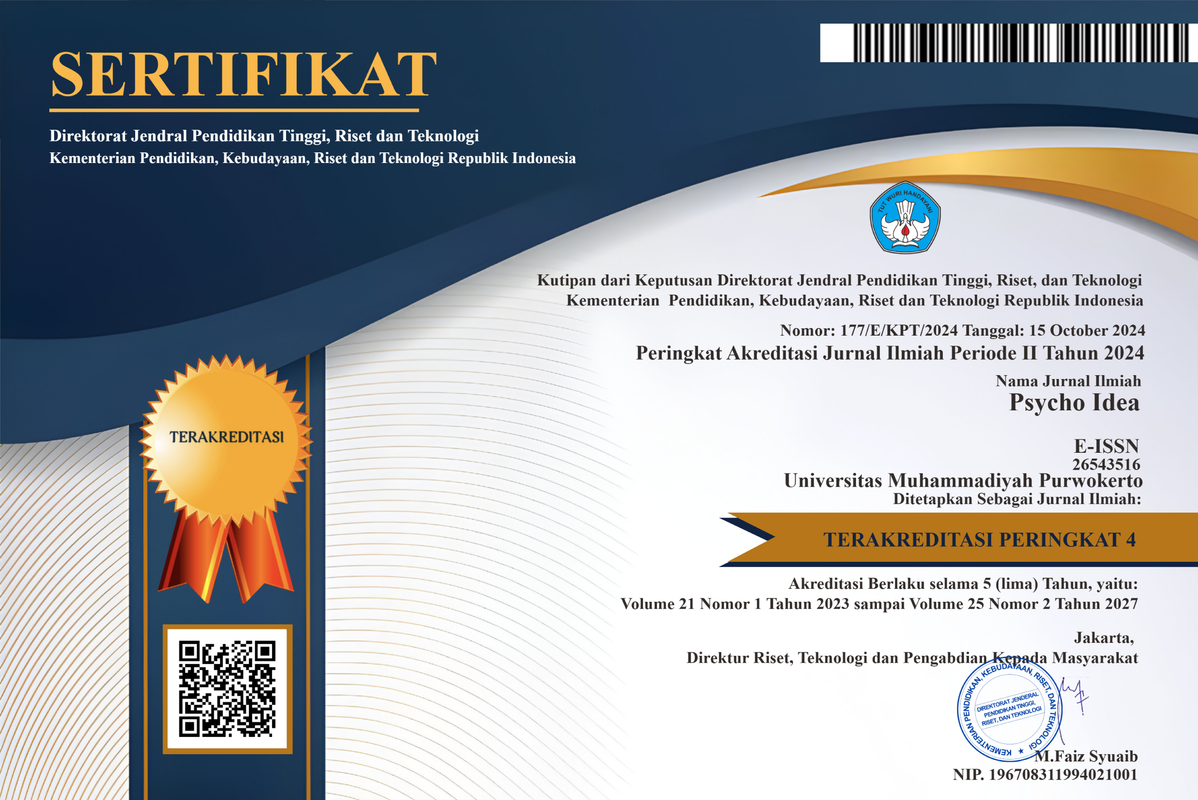ANALISIS DIMENSI EXTRAVERSION DAN DIMENSI CONSCIENTIOUSNESS (BIG FIVE PERSONALITY) DENGAN ORGANIZATIONAL CITIZENSHIP BEHAVIOR
DOI:
https://doi.org/10.30595/psychoidea.v15i2.2447Abstract
Penelitian ini bertujuan untuk menguji hubungan antara dimensi ekstraversion dan dimensi conscientiousness dengan OCB pada karyawan produksi. Sampel dalam penelitian ini sebanyak 60 orang sampel dengan menggunakan random sampling. Metode pengumpulan data adalah dengan menggunakan skala OCB dan IPIP (lima kepribadian besar) dari Goldberg. Teknik analisis data adalah dengan menggunakan analisis korelasi product moment. Berdasarkan hasil analisis data diperoleh hasil rxy = 0,383 (p <0,010) untuk dimensi ekstraversi dengan OCB dan rxy = 0,548 (p <0,010) untuk dimensi conscientiousness dengan OCB. Variabel dimensi ekstraversi memberikan kontribusi yang efektif sebesar 14,7% terhadap variabel dimensi OCB dan conscientiousness memberikan kontribusi efektif sebesar 30% untuk OCB.
Kata Kunci: Dimensi Extraversion, Dimensi Conscientiousness, Organizational
Citizenship Behavior
References
Ahdiyana.(2009). Dimensi OCB Dalam Kinerja.http://staff.uny.ac.id. (di akses 16 Juni 2016).
Andriyani, G., Djalali, M.A., & Sofiah, D. (2012).Organizational Citizenship Behavior Dan Kepuasan Kerja Pada Karyawan.Jurnal Penelitian Psikologi, 01 (01), 341-354.
Baharuddin, A., Alhabsyi, T., Utami, H.N. (2011). Pengaruh Pelatihan, Kompensasi, Dan Disiplin Kerja Terhadap Prestasi Kerja Karyawan. Jurnal Profit, 6 (2), 56-68.
Chwalibog, E. (2011). Personality, Temperament, Organizational Climate. Journal Education Culture And Society. https://books.google.co.id/books (di akses tanggal 7 Februari 2017).
Helmi, A.F. (1996). Disiplin Kerja. Buletin Psikologi, 4 (2), 32-42.
Henryadi. (2009). Organizational Citizenship Behavior.http://teorionline.net/organizational-citizenship-behavior-ocb/. (di akses 16 Juni 2016).
Indarti, S., Hendriani, S., & Mahda, M. (2014).Pengaruh Faktor Kepribadian Pegawai Dan Lingkungan Kerja Terhadap Kinerja Pegawai Pada Kantor Regional XII BKN Pekan Baru.Jurnal Ekonomi, 22 (1), 1-16.
Nasution, H. (2004). Pengelolaan Sumber Daya Manusia.http://usupress.usu.ac.id pengelolaan sumber daya manusia (di akses 16 Juni 2016).
Novliadi, F. (2007).Organizational Citizenship Behavior Karyawan Ditinjau dari Persepsi Terhadap Kualitas Interaksi Atasan-Bawahan dan Persepsi Terhadap Dukungan Organisasional. (Laporan Penelitian). Medan: Program Studi Psikologi Fakultas Kedokteran Universitas Sumatra Utara.
Organ, D.W., Podsakoff, P.M., &MacKenzie, S.B. (2006). Organizational Citizenship Behavior: Its Nature, Antecedents, and Consequences. SAGE Publications.
Pervin, L.A. & John, O.P. (2001). Personality: Theory and Research 8th Edition. New York: John Wiley & Sons, Inc.
Pratama, D.A., Pali, M., & Nurcahyo, F.A. (2012).Pengaruh Kepribadian Berdasarkan Big Five Personality Terhadap Kepuasan Kerja Karyawan Hotel.Jurnal Gema Aktualita, 1 (01), 57-67.
Purba, D.E., Seniati, A.N.L. (2004). Pengaruh Kepribadian Dan Komitmen Organisasi Terhadap Organizational Citizenship Behavior.Jurnal Makara Sosial Humaniora, 8 (3), 105-111.
Robbins, S.P., &Judge, T.A. (2015). Perilaku Organisasi (Edisi 16). Jakarta: Saleba Empat.
Soegandhi, V.M., Sutanto, E.M., & Setiawan, R. (2013). Pengaruh Kepuasan Kerja Dan Loyalitas Kerja Terhadap Organizational Citizenship Behavior Pada Karyawan PT Surya Timur Sakti Jatim.Jurnal Agora, 1 (01), 1-12.
Sumiyarsih, W., Mujiasih, E., Ariati, J. (2012).Hubungan Dengan Kecerdasan Emosional Dengan Organizational Citizenship Behavior Pada Karyawan CV. Ilmu Semarang.Jurnal Psikologi Undip, 11 (1), 19-27.
Wardani, AK., Suseno, M.N. (2012). Faktor Kepribadian Dan Organizational Citizenship Behavior Pada Polisi Pariwisata.Jurnal Humanitas, 9 (2), 193-204.
Zubaidah, L., Dwijanto, A.W. (2013). Pengaruh Faktor Komunikasi, Kepribadian Ekstraversi, Kepribadian Ketelitian Terhadap Prestasi Kerja. Jurnal Ilmu Manajemen, 1 (1), 26-39.
Downloads
Published
Issue
Section
License
Authors published in this journal agree to the following terms:
- The copyright of each article is retained by the author (s) without restrictions
- The journal allows the author(s) to retain publishing rights without restrictions
- The author grants the journal the first publication rights with the work simultaneously licensed under the Creative Commons Attribution License, allowing others to share the work with an acknowledgment of authorship and the initial publication in this journal.
- Authors may enter into separate additional contractual agreements for the non-exclusive distribution of published journal versions of the work (for example, posting them to institutional repositories or publishing them in a book), with acknowledgment of their initial publication in this journal
- Authors are permitted and encouraged to post their work online (For example in the Institutional Repository or on their website) before and during the submission process, as this can lead to productive exchanges, as well as earlier and larger citations of published work
- Articles and all related material published are distributed under a Creative Commons Attribution-4.0 International Public License (CC - BY 4.0).
License
Psycho Idea is licensed under a Creative Commons Attribution- 4.0 International Public License (CC - BY 4.0).
You are free to :
Share — copy and redistribute the material in any medium or format
Adapt — remix, transform, and build upon the material for any purpose, even commercially











